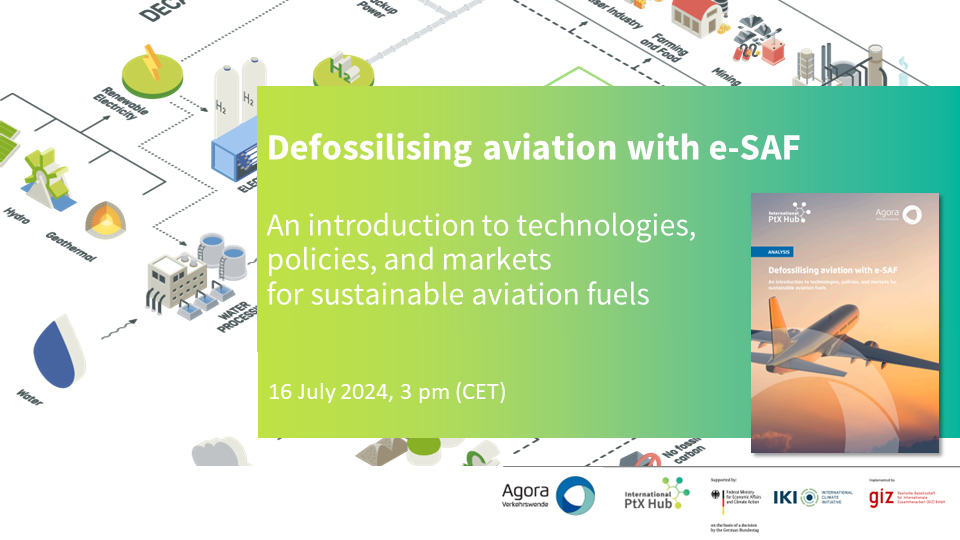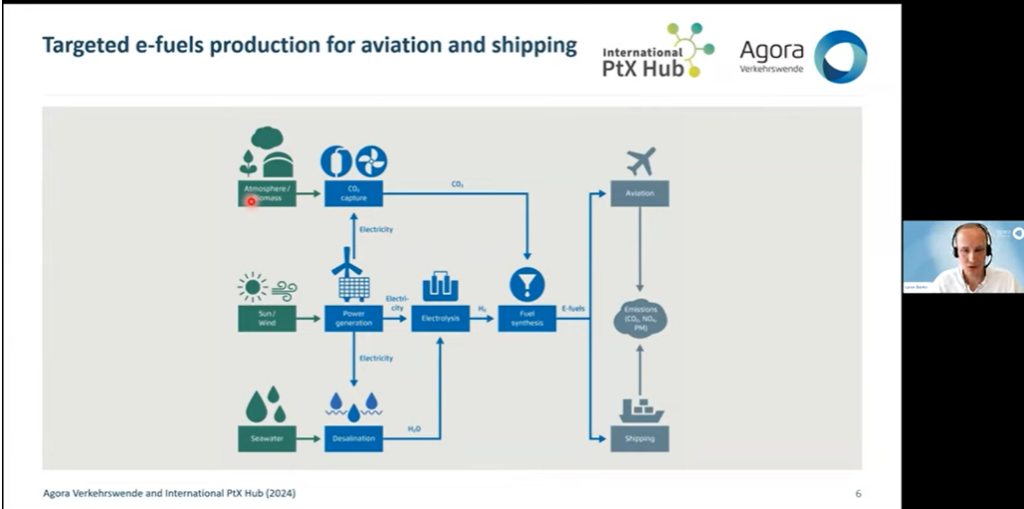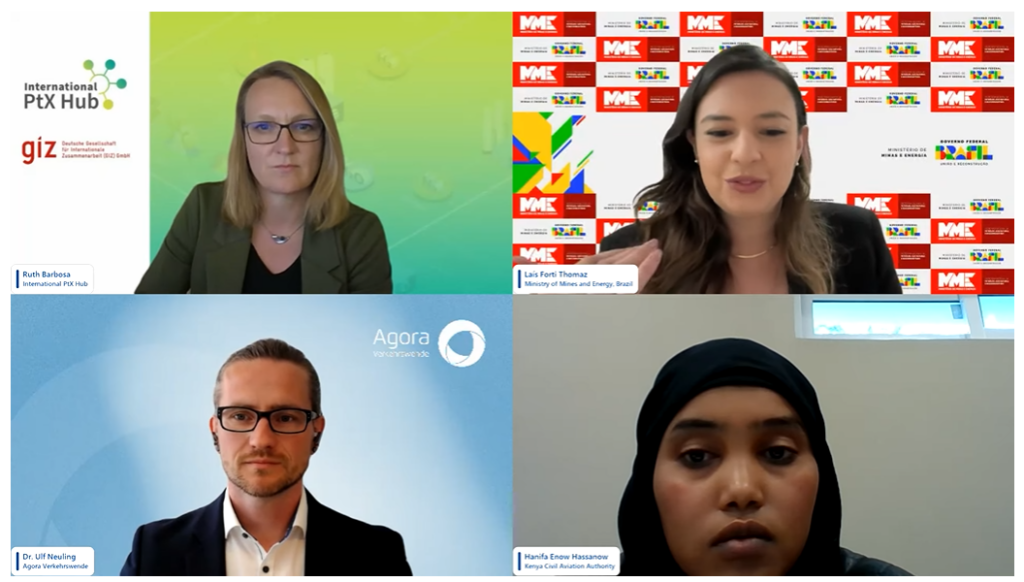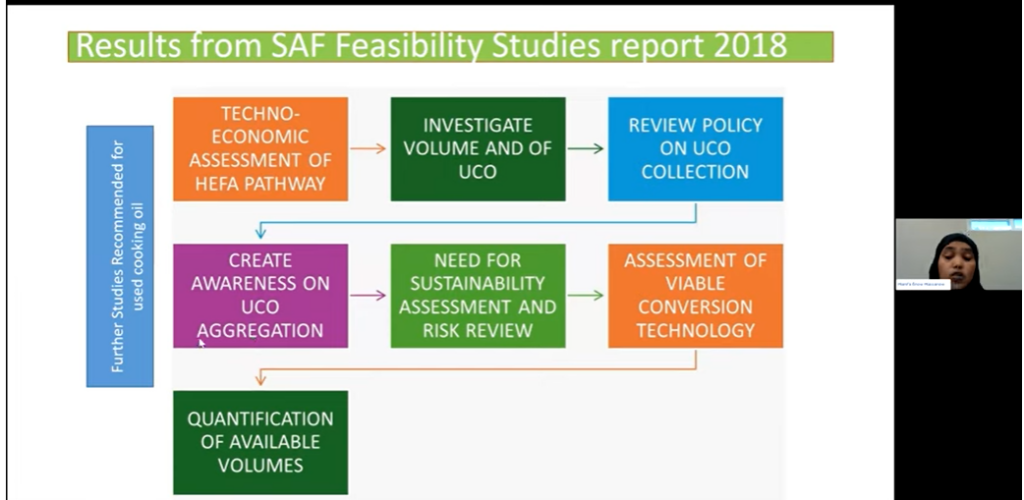The webinar titled “Defossilising Aviation with e-SAF” began with Ruth Barbosa, Advisor at the International Power-to-X (PtX) Hub, welcoming 205 participants, celebrating the launch of a significant publication alongside our partner, Agora Verkehrswende.
Frank Mischler on technological imperatives:
Frank Mischler, Director at the International PtX Hub, highlighted the aviation sector’s urgent need for Sustainable Aviation Fuels (SAF), noting that time is running out for effective climate action. He pointed to SAF, particularly e-SAF, as promising technologies essential for reducing aviation emissions. Mischler acknowledged that while countries like Brazil and Kenya have conducive conditions for SAF production, global efforts are needed to expand production and deployment to more countries.
Agora’s strategic approach:
The Deputy Director of Agora Verkehrwende, Wiebke Zimmer, outlined the organisation’s mission to achieve climate neutrality and international protection targets. Emphasising the aviation sector’s unique challenges in phasing out fossil fuels, she stressed the need for increased production and international cooperation in deploying e-SAF.
“Defossilising aviation with e-SAF” paper overview and key findings:
Leon Berks, from Agora Verkehrwende, presented key findings of the comprehensive paper on e-SAF production. The paper covers various facets, including production methods, cost considerations, policy implications, and sustainability standards. Berks accentuated the role of technological advancements and policy frameworks in achieving net-zero aviation emissions by 2050, underscoring the importance of e-SAF in reaching the defossilisation targets.
Cost considerations: Currently, e-SAF production costs are substantial, estimated at around €4240 per tonne. Looking ahead, costs are projected to decrease to €1090-€2620 per tonne by 2050, subject to market growth and economies of scale. Nevertheless, a significant gap persists between e-SAF production costs and those of conventional kerosene, priced at €650 per tonne in June 2024. Market dynamics could further escalate e-SAF prices beyond current projections, impacting adoption by potential buyers and investment decisions by producers.
Policy considerarions: Policy interventions are crucial to overcoming these challenges and stimulating e-SAF supply. Governments worldwide are introducing measures like mandatory blending quotas and CO2 reduction targets for airlines, particularly in regions like the European Union and Germany. These policies aim to create a conducive environment for e-SAF adoption despite uncertainties in production volumes matching policy demands.
In terms of sustainability: Beyond carbon reduction, e-SAF’s role in sustainable development encompasses economic benefits like local value creation and social impacts such as community inclusion and human rights considerations. A holistic approach is crucial, integrating environmental, economic, social, and governance aspects to ensure e-SAF production contributes to a just energy transition.
Brazil’s policies and projects for SAF:
Lais Thomas, Advisor to the Brazilian Ministry of Mines and Energy, Secretariat of Petroleum, Natural Gas and Biofuels, provided insights into Brazil’s proactive policies and ongoing projects aimed at advancing SAF. She highlighted Brazil’s favorable conditions for e-SAF production, leveraging its abundant biomass resources and commitment to sustainable development. Thomas showcased Brazil’s role in demonstrating scalable models for E-SAF production that can inspire other nations.
According to Lais, since 2009, regulatory efforts have focused on SAF integration, supported by initiatives like the SAF pathway calculator and the National Hydrogen Program launched in 2021. The approach in Brazil is to emphasise carbon reduction targets starting from 1% in 2027 to 10% by 2037, facilitating flexibility across different feedstocks like soybean and ethanol. The Fuel of the Future program aims to avoid 63 million tons of CO2 equivalent by 2037 through these measures. Collaborations with international partners, particularly in hydrogen and sustainable aviation, are compulsory for innovation and capacity building.
Kenya’s engagement for Clean Aviation:
Hanifa Hassanov, Environment Officer, at the Kenya Civil Aviation Authority (KCAA), discussed Kenya’s engagement in Clean Aviation and efforts to integrate SAF into the national aviation sector.
Hanifa outlined Kenya’s aviation sector progress towards achieving defossilisation and highlighted key initiatives such as the National Action Plan, SAF Roadmap, and regulatory developments. She discussed the current status of airports like Jomo Kenyatta International, Mombasa International, and others, noting daily aircraft movements and international flights. Kenya aims for 5% annual growth in its aviation industry and has committed to net-zero emissions by enacting the Climate Change Act 2023. The presentation demonstrated sustainable practices like solar energy projects at airports and the development of SAF from sources such as used cooking oil and sugarcane. Collaborative efforts with international partners and workshops focused on scaling up SAF production underscore Kenya’s proactive approach to environmental sustainability in aviation.
To sum up, transitioning from fossil fuels to e-SAF is imperative for defossilising the aviation sector. Policymakers must enact supportive frameworks, and industry leaders and investors must expand e-SAF supply rapidly. Focusing solely on favorable production regions is insufficient; a comprehensive strategy addressing all facets of e-SAF production—from renewables to governance—is essential for its success in transforming aviation towards sustainability.
Find the webinar recording here.
Access the publication here.



